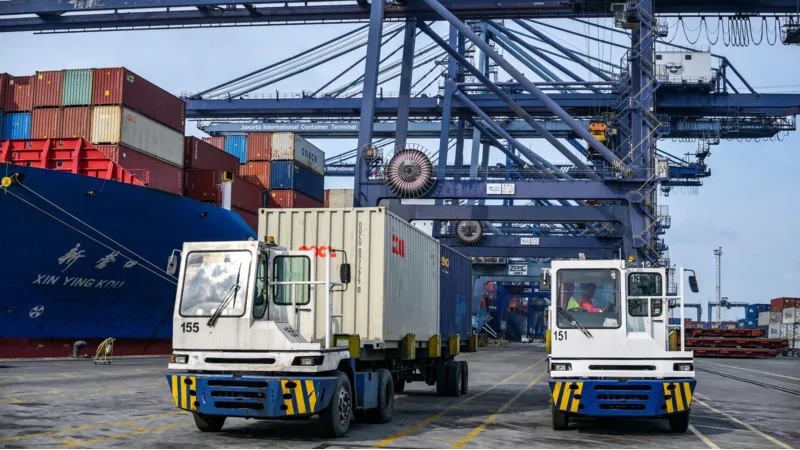In a significant development in international trade, the United States and Indonesia have finalized a comprehensive tariff agreement, reducing duties on Indonesian exports from the previously imposed 32% to 19%. The deal also opens the door for expanded bilateral trade, including major new Indonesian commitments to purchase American-made goods. The breakthrough comes after what Jakarta described as an “extraordinary struggle,” with direct negotiations between President Donald Trump and Indonesian President Prabowo Subianto leading to the final accord.
The announcement was first made on Truth Social, where Trump confirmed that Indonesia would waive tariffs on all incoming American goods. The deal also includes a commitment from Indonesia to buy $15 billion in U.S. energy, $4.5 billion in American agricultural products, and 50 Boeing jets, many of which are 777 models. These agreements come as part of a broader push by the Trump administration to establish what it calls “reciprocal and fair” trade practices.
A New Chapter in Bilateral Trade
In a post on Instagram, President Subianto emphasized the symbolic and economic significance of the agreement. “We have concluded to take trade relations between Indonesia and the United States into a new era of mutual benefit between our two great nations,” he wrote. The U.S. Trade Representative’s Office has not yet released the official text of the agreement, but early indications suggest it will restructure tariffs across multiple sectors, with a focus on streamlining energy, agriculture, and aerospace trade.
The Indonesian government praised the efforts of its negotiating team, led by the Coordinating Minister for Economic Affairs, calling the talks a “landmark moment” in its relationship with the U.S. Despite early tensions following the temporary 32% tariffs imposed in April, the new agreement significantly lowers trade barriers while preserving space for future negotiations in critical sectors like mining and telecommunications.
Copper Exports and Trade Symmetry
President Trump also hinted at favorable treatment for Indonesian copper exports, which currently face potential tariffs as high as 50%. Indonesia, while not a top copper supplier to the U.S. compared to Chile or Canada, shipped approximately $20 million worth of the metal last year. Trump described Indonesia’s copper as “high-quality” and potentially exempt from future duties if current trends continue.
Speaking with CNBC, U.S. Commerce Secretary Howard Lutnick explained that the revised agreement “rebalances the asymmetry” in trade between the two countries. “They won’t charge us tariffs. We’re charging them fair, measured tariffs now. It’s a step in the right direction.”
Industry Reaction and Business Concerns
While the agreement is being welcomed in some sectors, businesses remain cautious. With tariff rates fluctuating frequently, many manufacturers have delayed placing new orders from overseas, unsure of how future policies might impact pricing or logistics. Several American companies had scrambled to stock up on inventory before the April tariff hike took effect. Now, with the new 19% rate, there is greater clarity—but not full confidence—in long-term planning.
The Trump administration has encouraged businesses to relocate production to the U.S. to avoid uncertainty tied to foreign manufacturing. But critics argue that reshoring production is not a short-term solution due to the high costs and labor shortages that still affect multiple industrial regions. Even with strong encouragement, building or reactivating domestic facilities can take years and millions of dollars in investment.
Global Implications and Regional Context
Indonesia, now the United States’ 23rd largest trading partner, exported $28 billion in goods to the U.S. in 2024, primarily in apparel, footwear, and electronics, according to U.S. Commerce Department data. The U.S. exported about $10 billion in goods to Indonesia, mainly in oil and gas, as well as grains and oilseeds.
Trump’s approach to trade has disrupted conventional diplomacy and introduced volatility in negotiations. So far in 2025, he has announced four new trade deals, including with Vietnam, although details on some of these agreements remain sparse. During Tuesday’s announcement, Trump also suggested that India was “working along the same lines” as Indonesia in seeking a deal.
Whether these agreements result in long-term structural change remains to be seen. Many trade analysts point out that while reciprocal tariffs aim to protect U.S. industry, the economic burden could still fall on American consumers, especially if companies pass higher production costs downstream. With tariffs set to rise again on August 1 for countries not under revised agreements, time is short for many U.S. trading partners to strike similar deals.







